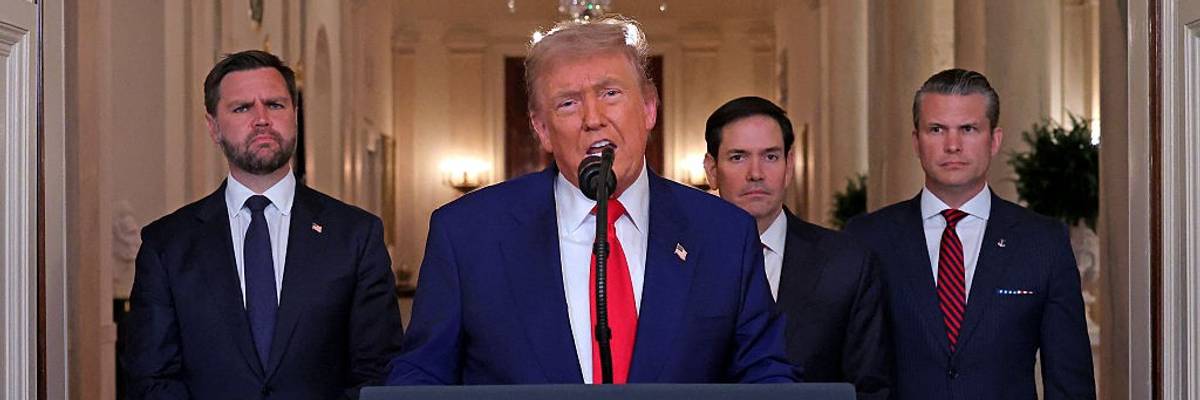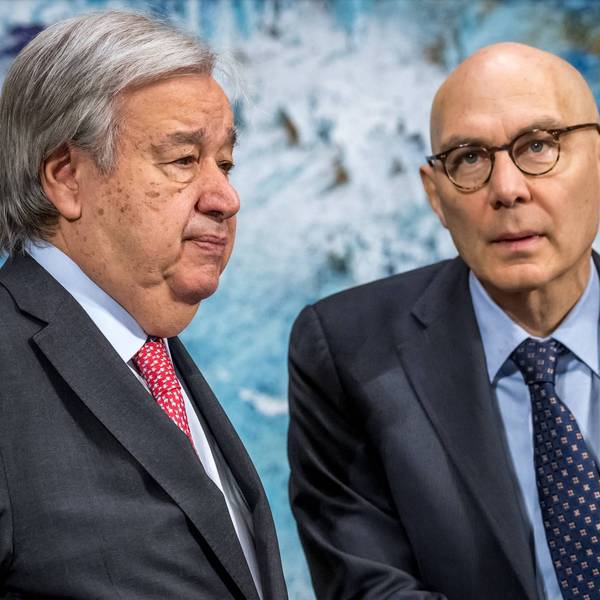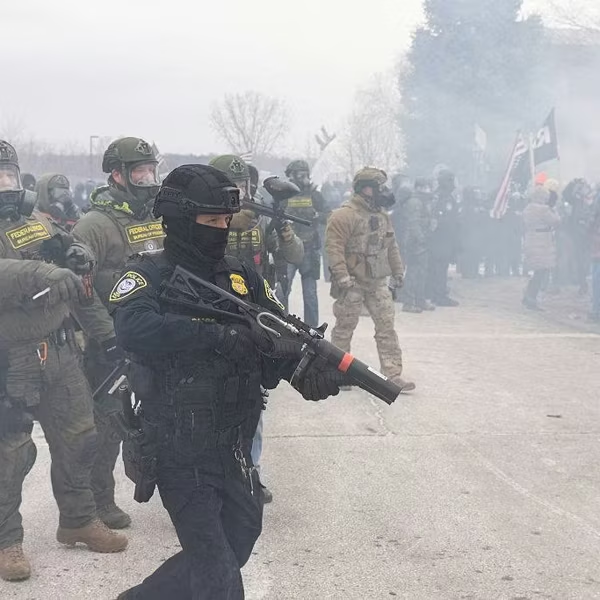
US President Donald Trump addresses the nation alongside Vice President JD Vance, Secretary of State Marco Rubio, and Secretary of Defense Pete Hegseth from the White House in Washington, DC on June 21, 2025.
'Chilling Attempt to Evade Accountability': Trump to Boycott UN Human Rights Review
One ACLU expert said the move sets "a terrible precedent that would only embolden dictators and autocrats and dangerously weaken respect for human rights at home and abroad."
The ACLU on Thursday condemned President Donald Trump's administration for refusing to participate in a United Nations mechanism "that calls for each UN member state to undergo a peer review of its human rights records."
The president's decision to ditch the Universal Periodic Review (UPR) follows a February executive order withdrawing from various world bodies, including the United Nations Human Rights Council (UNHRC), which he previously abandoned during his first term.
"The Trump administration's decision to boycott the UPR puts the US among the ranks of the worst violators of human rights," said Jamil Dakwar, director of the ACLU's Human Rights Program. "This move is a chilling attempt to evade accountability, setting a terrible precedent that would only embolden dictators and autocrats and dangerously weaken respect for human rights at home and abroad."
"The ACLU will continue to hold the Trump administration accountable for US human rights obligations and calls on Congress and state and local elected officials to join the fight to defend human dignity and everyone's basic rights and freedoms as promised by the Universal Declaration of Human Rights," Dakwar added.
trump/rubio say they're not participating in part b/c the council doesn't condemn human rights violators. THIS IS TOTAL BS. JOURNALISTS - please do not be stenographers on this. the council is far/very far from perfect. but it has been a major voice condemning violations globally.
— David Kaye (@davidakaye.bsky.social) August 28, 2025 at 11:22 AM
The Trump administration has faced mounting criticism since the February order, including after it missed an August 4 deadline to submit a national report in preparation for the next cycle of the UPR, set to take place in November.
After that deadline passed, the UPR Project at the United Kingdom's Birmingham City University and the UPR Academic Network released a joint statement noting that the US "participated in its previous three cycles of UPR in 2010, 2015, and 2020 and engaged as a recommending UN member state from the UPR's inception in 2008 until recently."
"The UPR is a nonconfrontational, cooperative mechanism which enables constructive dialogue between states on human rights. It is also a method of national self-reflection involving dialogue between civil society and the state," the signatories stressed, calling on the US to resume cooperation and other UN member states, UNHRC President Jürg Lauber, and the wider international community "to take appropriate steps and measures" encouraging the administration to do so.
The Lebanese Center for Human Rights (CLDH) reshared that statement on social media Thursday, declaring that the US position is "threatening global human rights accountability and international dialogue," and this is a "critical moment for human rights!"
The ACLU and CLDH comments came after Agence France-Presse confirmed the Trump administration's refusal to participate in the review, reporting on a Thursday letter that the US mission sent to UN High Commissioner for Human Rights Volker Türk.
According to AFP:
Thursday's letter said that the UPR system, which was created after the establishment of the rights council in 2006, was meant to be "based on objective and reliable information and conducted in a manner that ensures equal treatment" of all countries.
"However, this is not the case today," it charged, adding that "the United States objects to the politicization of human rights across the UN system, as well as the UN's unrelenting selective bias against Israel."
It also accused the UN of "ignoring human rights abuses in China, North Korea, Cuba and Venezuela," which it said had "tarnished the UPR process" and other rights council mechanisms.
UNHRC spokesperson Pascal Sim told the news agency that "since the inception of the UPR in 2008, the secretariat has occasionally received requests from states to postpone reviews," often due to national crises, and the council will discuss how to proceed on the US review when it meets for a month beginning September 8.
Thursday's letter and the backlash come after US Secretary of State Marco Rubio and his department put out an annual report on other nations' human rights conditions earlier this month—a day after a coalition of LGBTQ+ and human rights groups sued over the administration's delay in releasing the congressionally mandated publication.
Amanda Klasing, Amnesty International USA's national director of government relations and advocacy, said at the time that the report made "clear that the Trump administration has engaged in a very selective documentation of human rights abuses in certain countries." Other critics highlighted Israel as an example of this.
Charles Blaha, a former State Department official who now serves as a senior adviser at DAWN, which advocates for democracy and human rights in the Middle East, called it "functionally useless for Congress and the public " and "nothing more than a pro-Israel document."
An Urgent Message From Our Co-Founder
Dear Common Dreams reader, The U.S. is on a fast track to authoritarianism like nothing I've ever seen. Meanwhile, corporate news outlets are utterly capitulating to Trump, twisting their coverage to avoid drawing his ire while lining up to stuff cash in his pockets. That's why I believe that Common Dreams is doing the best and most consequential reporting that we've ever done. Our small but mighty team is a progressive reporting powerhouse, covering the news every day that the corporate media never will. Our mission has always been simple: To inform. To inspire. And to ignite change for the common good. Now here's the key piece that I want all our readers to understand: None of this would be possible without your financial support. That's not just some fundraising cliche. It's the absolute and literal truth. We don't accept corporate advertising and never will. We don't have a paywall because we don't think people should be blocked from critical news based on their ability to pay. Everything we do is funded by the donations of readers like you. Will you donate now to help power the nonprofit, independent reporting of Common Dreams? Thank you for being a vital member of our community. Together, we can keep independent journalism alive when it’s needed most. - Craig Brown, Co-founder |
The ACLU on Thursday condemned President Donald Trump's administration for refusing to participate in a United Nations mechanism "that calls for each UN member state to undergo a peer review of its human rights records."
The president's decision to ditch the Universal Periodic Review (UPR) follows a February executive order withdrawing from various world bodies, including the United Nations Human Rights Council (UNHRC), which he previously abandoned during his first term.
"The Trump administration's decision to boycott the UPR puts the US among the ranks of the worst violators of human rights," said Jamil Dakwar, director of the ACLU's Human Rights Program. "This move is a chilling attempt to evade accountability, setting a terrible precedent that would only embolden dictators and autocrats and dangerously weaken respect for human rights at home and abroad."
"The ACLU will continue to hold the Trump administration accountable for US human rights obligations and calls on Congress and state and local elected officials to join the fight to defend human dignity and everyone's basic rights and freedoms as promised by the Universal Declaration of Human Rights," Dakwar added.
trump/rubio say they're not participating in part b/c the council doesn't condemn human rights violators. THIS IS TOTAL BS. JOURNALISTS - please do not be stenographers on this. the council is far/very far from perfect. but it has been a major voice condemning violations globally.
— David Kaye (@davidakaye.bsky.social) August 28, 2025 at 11:22 AM
The Trump administration has faced mounting criticism since the February order, including after it missed an August 4 deadline to submit a national report in preparation for the next cycle of the UPR, set to take place in November.
After that deadline passed, the UPR Project at the United Kingdom's Birmingham City University and the UPR Academic Network released a joint statement noting that the US "participated in its previous three cycles of UPR in 2010, 2015, and 2020 and engaged as a recommending UN member state from the UPR's inception in 2008 until recently."
"The UPR is a nonconfrontational, cooperative mechanism which enables constructive dialogue between states on human rights. It is also a method of national self-reflection involving dialogue between civil society and the state," the signatories stressed, calling on the US to resume cooperation and other UN member states, UNHRC President Jürg Lauber, and the wider international community "to take appropriate steps and measures" encouraging the administration to do so.
The Lebanese Center for Human Rights (CLDH) reshared that statement on social media Thursday, declaring that the US position is "threatening global human rights accountability and international dialogue," and this is a "critical moment for human rights!"
The ACLU and CLDH comments came after Agence France-Presse confirmed the Trump administration's refusal to participate in the review, reporting on a Thursday letter that the US mission sent to UN High Commissioner for Human Rights Volker Türk.
According to AFP:
Thursday's letter said that the UPR system, which was created after the establishment of the rights council in 2006, was meant to be "based on objective and reliable information and conducted in a manner that ensures equal treatment" of all countries.
"However, this is not the case today," it charged, adding that "the United States objects to the politicization of human rights across the UN system, as well as the UN's unrelenting selective bias against Israel."
It also accused the UN of "ignoring human rights abuses in China, North Korea, Cuba and Venezuela," which it said had "tarnished the UPR process" and other rights council mechanisms.
UNHRC spokesperson Pascal Sim told the news agency that "since the inception of the UPR in 2008, the secretariat has occasionally received requests from states to postpone reviews," often due to national crises, and the council will discuss how to proceed on the US review when it meets for a month beginning September 8.
Thursday's letter and the backlash come after US Secretary of State Marco Rubio and his department put out an annual report on other nations' human rights conditions earlier this month—a day after a coalition of LGBTQ+ and human rights groups sued over the administration's delay in releasing the congressionally mandated publication.
Amanda Klasing, Amnesty International USA's national director of government relations and advocacy, said at the time that the report made "clear that the Trump administration has engaged in a very selective documentation of human rights abuses in certain countries." Other critics highlighted Israel as an example of this.
Charles Blaha, a former State Department official who now serves as a senior adviser at DAWN, which advocates for democracy and human rights in the Middle East, called it "functionally useless for Congress and the public " and "nothing more than a pro-Israel document."
- Six Months Into His Presidency, Trump Has Created a Global Humanitarian Catastrophe ›
- 'Unparalleled Attack on the Rule of Law' by Trump Puts US on Global Watchlist ›
- Rights Groups to UN: Trump Tactics Bear 'Hallmarks of Fascist Regimes' ›
- 'We'll Own It': Trump Floats US Takeover of Gaza—After Ethnically Cleansing Palestinians ›
- Climate Defenders Blast Trump's 'Reckless' UN Speech | Common Dreams ›
- Opinion | Trump's GOP Attacked Our Rights Mercilessly in 2025, But We Will Not Be Erased | Common Dreams ›
- UN Chief: 2025 Was 'Profoundly Challenging Year for International Cooperation' | Common Dreams ›
The ACLU on Thursday condemned President Donald Trump's administration for refusing to participate in a United Nations mechanism "that calls for each UN member state to undergo a peer review of its human rights records."
The president's decision to ditch the Universal Periodic Review (UPR) follows a February executive order withdrawing from various world bodies, including the United Nations Human Rights Council (UNHRC), which he previously abandoned during his first term.
"The Trump administration's decision to boycott the UPR puts the US among the ranks of the worst violators of human rights," said Jamil Dakwar, director of the ACLU's Human Rights Program. "This move is a chilling attempt to evade accountability, setting a terrible precedent that would only embolden dictators and autocrats and dangerously weaken respect for human rights at home and abroad."
"The ACLU will continue to hold the Trump administration accountable for US human rights obligations and calls on Congress and state and local elected officials to join the fight to defend human dignity and everyone's basic rights and freedoms as promised by the Universal Declaration of Human Rights," Dakwar added.
trump/rubio say they're not participating in part b/c the council doesn't condemn human rights violators. THIS IS TOTAL BS. JOURNALISTS - please do not be stenographers on this. the council is far/very far from perfect. but it has been a major voice condemning violations globally.
— David Kaye (@davidakaye.bsky.social) August 28, 2025 at 11:22 AM
The Trump administration has faced mounting criticism since the February order, including after it missed an August 4 deadline to submit a national report in preparation for the next cycle of the UPR, set to take place in November.
After that deadline passed, the UPR Project at the United Kingdom's Birmingham City University and the UPR Academic Network released a joint statement noting that the US "participated in its previous three cycles of UPR in 2010, 2015, and 2020 and engaged as a recommending UN member state from the UPR's inception in 2008 until recently."
"The UPR is a nonconfrontational, cooperative mechanism which enables constructive dialogue between states on human rights. It is also a method of national self-reflection involving dialogue between civil society and the state," the signatories stressed, calling on the US to resume cooperation and other UN member states, UNHRC President Jürg Lauber, and the wider international community "to take appropriate steps and measures" encouraging the administration to do so.
The Lebanese Center for Human Rights (CLDH) reshared that statement on social media Thursday, declaring that the US position is "threatening global human rights accountability and international dialogue," and this is a "critical moment for human rights!"
The ACLU and CLDH comments came after Agence France-Presse confirmed the Trump administration's refusal to participate in the review, reporting on a Thursday letter that the US mission sent to UN High Commissioner for Human Rights Volker Türk.
According to AFP:
Thursday's letter said that the UPR system, which was created after the establishment of the rights council in 2006, was meant to be "based on objective and reliable information and conducted in a manner that ensures equal treatment" of all countries.
"However, this is not the case today," it charged, adding that "the United States objects to the politicization of human rights across the UN system, as well as the UN's unrelenting selective bias against Israel."
It also accused the UN of "ignoring human rights abuses in China, North Korea, Cuba and Venezuela," which it said had "tarnished the UPR process" and other rights council mechanisms.
UNHRC spokesperson Pascal Sim told the news agency that "since the inception of the UPR in 2008, the secretariat has occasionally received requests from states to postpone reviews," often due to national crises, and the council will discuss how to proceed on the US review when it meets for a month beginning September 8.
Thursday's letter and the backlash come after US Secretary of State Marco Rubio and his department put out an annual report on other nations' human rights conditions earlier this month—a day after a coalition of LGBTQ+ and human rights groups sued over the administration's delay in releasing the congressionally mandated publication.
Amanda Klasing, Amnesty International USA's national director of government relations and advocacy, said at the time that the report made "clear that the Trump administration has engaged in a very selective documentation of human rights abuses in certain countries." Other critics highlighted Israel as an example of this.
Charles Blaha, a former State Department official who now serves as a senior adviser at DAWN, which advocates for democracy and human rights in the Middle East, called it "functionally useless for Congress and the public " and "nothing more than a pro-Israel document."
- Six Months Into His Presidency, Trump Has Created a Global Humanitarian Catastrophe ›
- 'Unparalleled Attack on the Rule of Law' by Trump Puts US on Global Watchlist ›
- Rights Groups to UN: Trump Tactics Bear 'Hallmarks of Fascist Regimes' ›
- 'We'll Own It': Trump Floats US Takeover of Gaza—After Ethnically Cleansing Palestinians ›
- Climate Defenders Blast Trump's 'Reckless' UN Speech | Common Dreams ›
- Opinion | Trump's GOP Attacked Our Rights Mercilessly in 2025, But We Will Not Be Erased | Common Dreams ›
- UN Chief: 2025 Was 'Profoundly Challenging Year for International Cooperation' | Common Dreams ›

